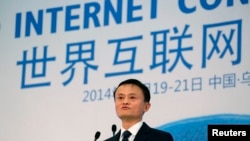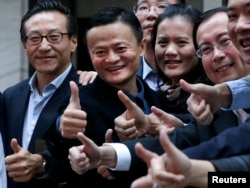China saw its number of billionaires grow by 30 percent to 40 percent annually, but is still recording charitable donations at a small fraction of the rates seen in Europe and the United States.
A new report by the United Nations Development Program found that charitable donations are about 4 percent of those in the West.
The year 2015 saw 38 percent growth in the number of billionaires in China, according to a Forbes magazine study. Their net worth rose by $170 billion, reaching $830 billion in 2015. China is the world's second-biggest producer of billionaires after the United States.
One reason for the lack of donations is the lack of transparency in the functioning of charity organizations, and widely held suspicion about the use of funds raised for social welfare, Gu Qing, assistant country director for Poverty, Equity & Governance at UNDP's China office, told VOA.
"There have been some major scandals on the use of funds collected for charity. Also, there are few tax benefits to encourage donations," Gu said. An unclear legal and policy framework have added to the general reluctance to give.
Give and take
In China, charity donations by business people and companies are mostly give-and-take deals, said Oliver Rui, professor of finance at China Europe International Business School, or CEIBS.
"Donors often cut under-table deals for getting favors from local government bodies in return for donations," Rui said. "Most charity foundations are directly or indirectly affiliated with government agencies. People either stay away from them or cut deals."
There are some improvements, however. The UNDP report found there was a 60 percent increase in the past five years in the number of charity foundations, which stood at 4,211 in 2015. Analysts said this was not very significant in an economy which has grown at 8 to 10 percent in recent years.
Government strategy
China recently came out with new laws that imposed severe restrictions on foreign non-government organizations, and a set of new regulations for charity organizations. China wants to discourage the growth of an independent civil society and divert funds and energies to certain chosen fields, said Josh Freedman, research manager at consulting firm China Policy.
"The government is trying to redefine charity. It is welcoming donations in charities that support its own goals — like poverty eradication, disaster relief and environmental protection; but, it wants to curb NGOs that encourage labor activism or support political groups," Freedman said.
Official controls on domestic charities remain despite some relaxation on their operations in the new law. For example, a charity is not allowed to raise funds outside the county in which it is registered. This allows local officials to watch and control the flow of funds.
Experts fear that keeping foreign NGOs out of the picture would make it difficult for China to develop a responsible and efficient network of charity organizations. Some experts even question the wisdom of separating the goals of charity from the need to develop an independent and self-sustaining civil society.
"At UNDP, we believe that a strong and healthy philanthropic sector in China, confident in looking outside its borders, will benefit China as well as the rest of the world," Patrick Haverman, deputy country director of UNDP China, said while releasing the report.
Chinese Bill Gates?
Unlike in the U.S. and Europe, the super-rich in China do not set an example by donating huge sums to charities. There are none like Bill Gates or Warren Buffett in China.
A different picture emerged last week when e-commerce tycoon and Alibaba head Jack Ma announced he will give away a large part of his income to Alibaba Group Charitable Fund and other charities. Ma, who is the world's 33rd richest man with an individual net worth of $20 billion, also said he will not claim income tax deductions that would be available to him for giving.
The announcement is being seen in different perspectives in different quarters.
"Jack Ma is doing it for public relations. There have been some negative news about his company. He wants to enhance his reputation by giving to charity," Rui of CEIBS said.
Some Chinese business people view charity as a networking tool that will advance their business interests. Besides, there is a realization that they must donate to local charities in order to smooth the process of acquiring companies in foreign countries, he said.
Freedman of China Policy said the e-commerce tycoon may have been influenced by his long association with businessmen and life in the United States.
"Corporate social responsibility has yet to become an acceptable trend in China. Some businessmen use charity as a business tool; but, the situation is improving gradually," Freedman said.
Internet of charitable things
International organizations like the UNDP are trying to persuade China to open up facilities for giving donations through the Internet because a substantial part of the population is connected, mostly through mobile phones. The government recently cracked down on the use of the Internet for giving and collecting donations after some instances of misuse arose.
"We believe the internet is the future direction for China's philanthropy growth. There are many people wanting to contribute to society through mobile payments," Gu of UNDP said.





